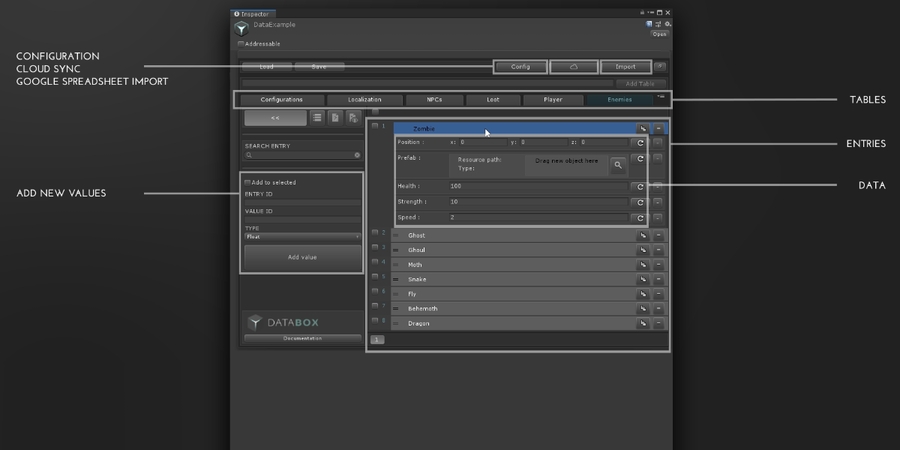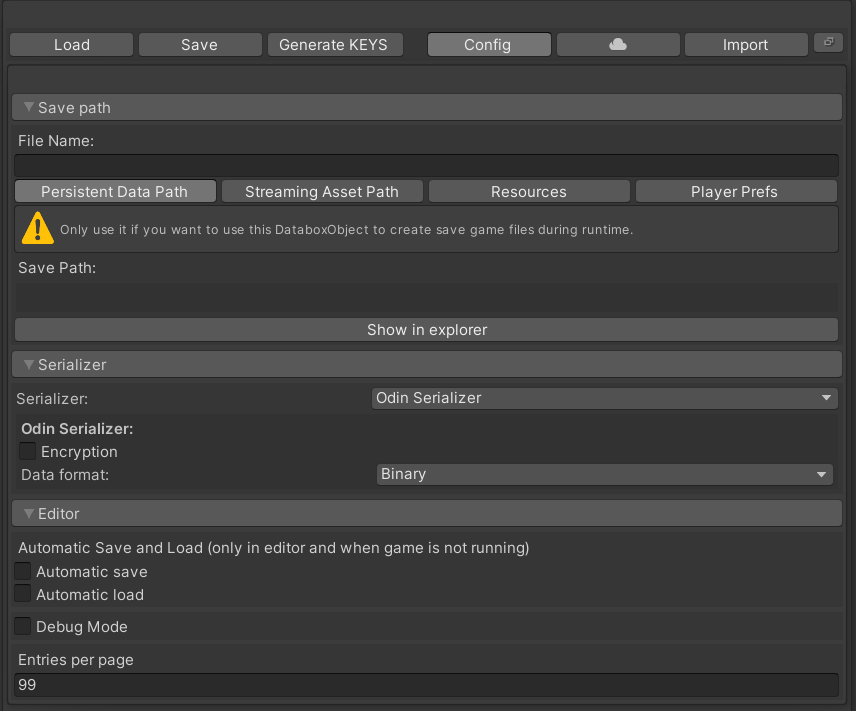Databox Object
Databox Object
The Databox object serves as a container for your loaded data. Your data is saved to a file. Depending on your project you can have multiple Databox objects or just one which loads different files at runtime. When referencing a Databox object you have access to several methods for accessing the data, loading and saving at runtime.
Configuration
Save path
Before you can start adding data to your Databox object. You will need to specify a file name and a save path in the config. menu.
File name
The file name relative to the chosen save folder. You can also specify a subfolder.
Please note: due to the nature of how text/binary files are being loaded from the Resources folder by Unity, you will need to specify either .txt or .json as the file extension.
Persistent Data Path:
Should be used for save game data only. Do not use it for your initial database data as it will not be included in a build.
Streaming Asset Path:
Uses the "StreamingAssets" folder inside of your project. Great for files that should be loaded during runtime.
Resources:
Use the resources path for loading the database file from a resources folder. It's not possible to save to a resources folder during runtime.
PlayerPrefs:
Player prefs are a good way to create save games at runtime. Do not use it for your initial database data as it will not be included in a build.
Make sure to check out the official Unity documentation regarding the different save paths:
Persistent data path Streaming Assets
Serializer
Databox supports two different serializers. If you want to know more about those, please have a look at this page here: Serializers
Full Serializer
Encryption
Databox supports a simple XOR encryption. When enabled you'll need to provide an encryption key.
Compress Json Compressing the json file significantly reduces the file size. On the other hand, the json file is no longer easy to read in a text editing tool.
Odin Serializer
Encryption
Databox supports a simple XOR encryption. When enabled you'll need to provide an encryption key.
Data Format
Odin serializer supports two different data formats.
*JSON: Saves the data in a json formated file
*Binary: Saves the data in a binary formated file. Usually smaller file size compared to json.
Editor
Automatic save
When enabled, Databox saves all changes made automatically. (Only in editor)
Automatic load
When enabled, Databox loads the data automatically when the Databox object is being selected in the editor.
!> You will still need to load the data at runtime.
Debug Mode
By enabling debug mode, Databox will create console logs on several events.
Entries per page
Configure how many entries should be displayed per page in the Databox editor.
Generate Keys
Instead of using strings for calling GetData and AddData - which can be error prone - you can generate static keys from your DataboxObject. Another great advantage is, that static keys are structured in classes and sub-classes based on tables and entries.
Simply click on the Generate Keys button in the Databox Object editor.
Select a file name and click on save.
Example:
The keys are now accessible by using the databox object name + "_KEYS". Let's assume we have a DataboxObject called PlayerData then we can use:
GetData Example:
Last updated


